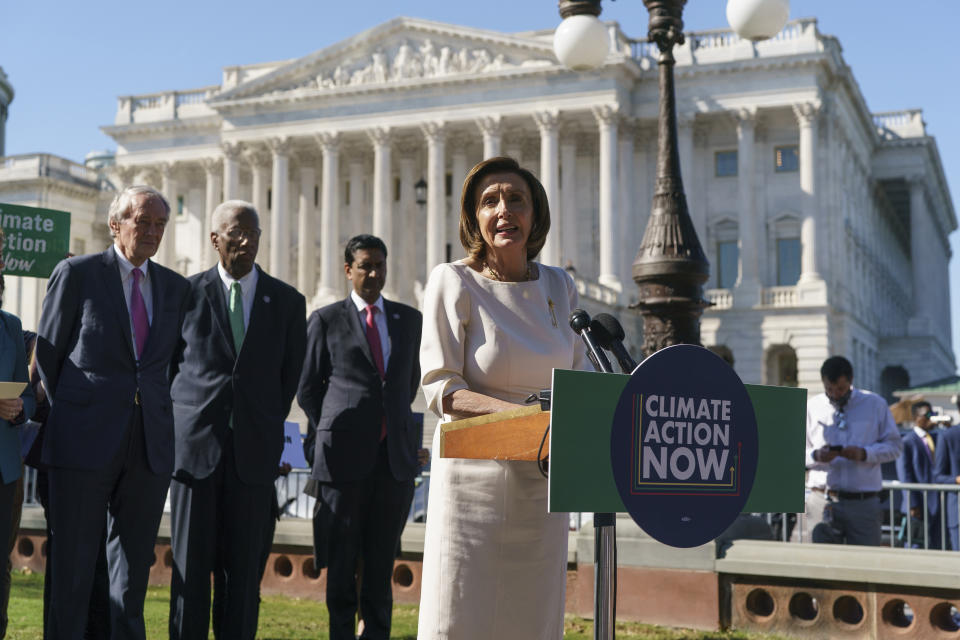What's in, and what's out, as Biden offers scaled-back plan
- Oops!Something went wrong.Please try again later.
WASHINGTON (AP) — After months of talks with Democratic lawmakers, President Joe Biden outlined Thursday a $1.75 trillion framework to support families and education as well as protect against global warming.
The updated plan includes universal preschool, funding to limit child care costs and a one-year continuation of a child tax credit that was expanded earlier this year and applied to more families. But Democrats are scaling back some investments and shortening the timeframe for funding to whittle down spending. Some proposals were dropped entirely. More negotiations are possible.
The framework fits an approximately $1.75 trillion budget over 10 years, rather than the $3.5 trillion budget plan originally envisioned.
Here's what's in the package, according to the White House:
TAX BREAKS
— An expanded child tax credit would continue for another year. As part of a COVID relief bill, Democrats increased the tax credit to $3,000 per child age 6-17 and $3,600 per child age 5 and under. Households earning up to $150,000 per year get the credit paid out to them on a monthly basis. Budget hawks worry that a one-year extension is a budgetary tool that will lower the cost of the program on paper, but mask its true costs since lawmakers tend to continue programs rather than let them expire.
— Continue for one year the expanded Earned Income Tax Credit that goes to 17 million childless, low-income workers.
EDUCATION
— Universal prekindergarten for all 3- and 4-year-olds and child-care subsidies for poorer and middle-income Americans are part of the package. But the programs are only funded for six years.
— Provide $40 billion for higher education and workforce development. This includes raising the size of Pell Grants and providing funding for historically Black colleges and universities as well as institutions where students are largely Hispanic or serve tribal communities.
HEALTH CARE
— Medicare would be expanded to cover hearing aids, costing an estimated $35 billion over 10 years.
— Expanded tax credits for insurance premiums tied to the Affordable Care Act would be extended through 2025. The White House said it would help 3 million uninsured people gain coverage.
— Provide $150 billion for a Medicaid program that supports home health care, helping to clear a backlog and improving working conditions.
— Provide $90 billion for investments that would include funding maternal health, community violence initiatives, disadvantaged farmers, nutrition and pandemic preparation.
CHILD CARE
— Biden’s plan calls for parents earning up to 250% of a state’s median income to pay no more than 7% of their income on child care. Parents must be working, seeking a job, in school or dealing with a health issue to qualify.
HOUSING
— Commit $150 billion toward housing affordability with the goal of building more than 1 million new rental and single-family homes. The goal would be to reduce price pressures by providing rental and down payment assistance.
ENVIRONMENT
— Fund $320 billion worth of clean energy tax credits. These credits over 10 years would help businesses and homeowners shift to renewable energy sources for electricity, vehicles and manufacturing.
— Direct $105 billion toward investments that would improve communities' ability to withstand the extreme weather caused by climate change. The funding would also create a Civilian Climate Corps that focuses on conserving public lands and bolster community resilience to flooding, drought and other weather emergencies.
— Provide $110 billion to help develop new domestic supply chains and develop new solar and battery technologies. Support would also be given to existing steel, cement and aluminum industries.
— Use $20 billion for the government to become the buyer of clean energy technologies as part of the procurement process.
TAXES
— Beefs up the IRS to improve collections and close the gap between taxes owed and taxes paid.
— A 15% minimum income tax on large corporations, along with a 1% surcharge on corporate stock buybacks.
— A new surtax on multi-millionaires and billionaires.
— Aligning the U.S. with an agreement reached by more than 100 countries earlier this month designed to deter multinational companies from stashing profits in low-tax countries.
— Closes a provision that allows some wealthy taxpayers to avoid paying the 3.8% Medicare tax on their earnings.
WHAT'S OUT OF THE BILL
— A proposal to expand Medicare to cover dental and vision care is out because of concerns about the overall costs.
— A proposal to provide paid family and medical leave to new parents, those caring for loved ones or those recovering from an illness. The United States is one of the only countries in the world that doesn’t guarantee paid leave.
— A proposal to have Medicare negotiate prescription drug prices.



